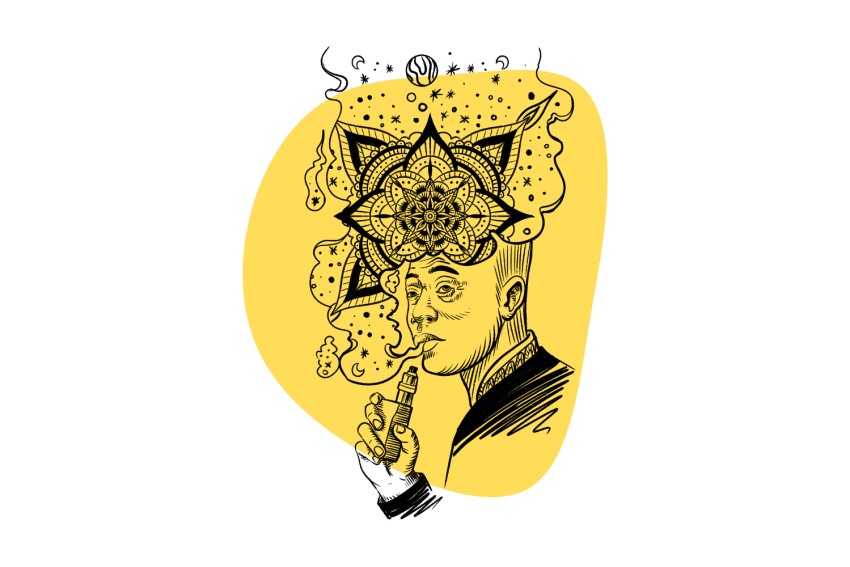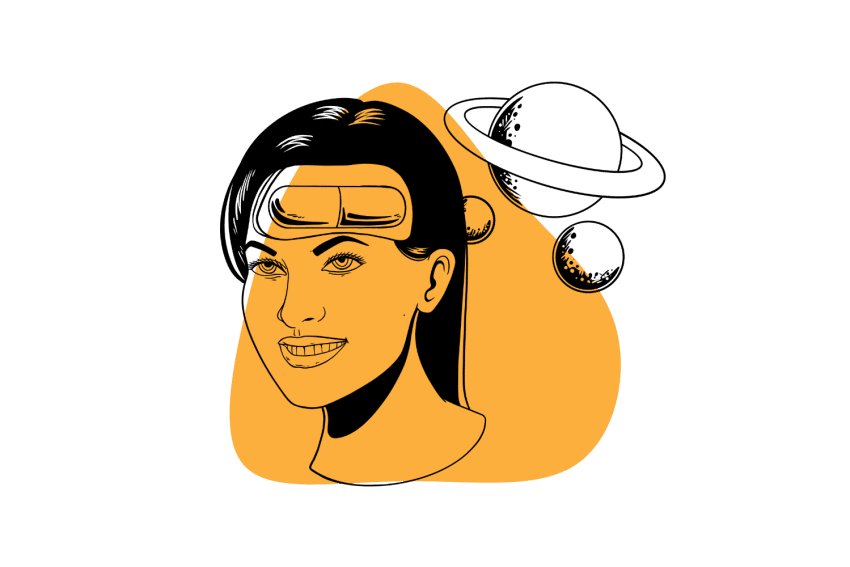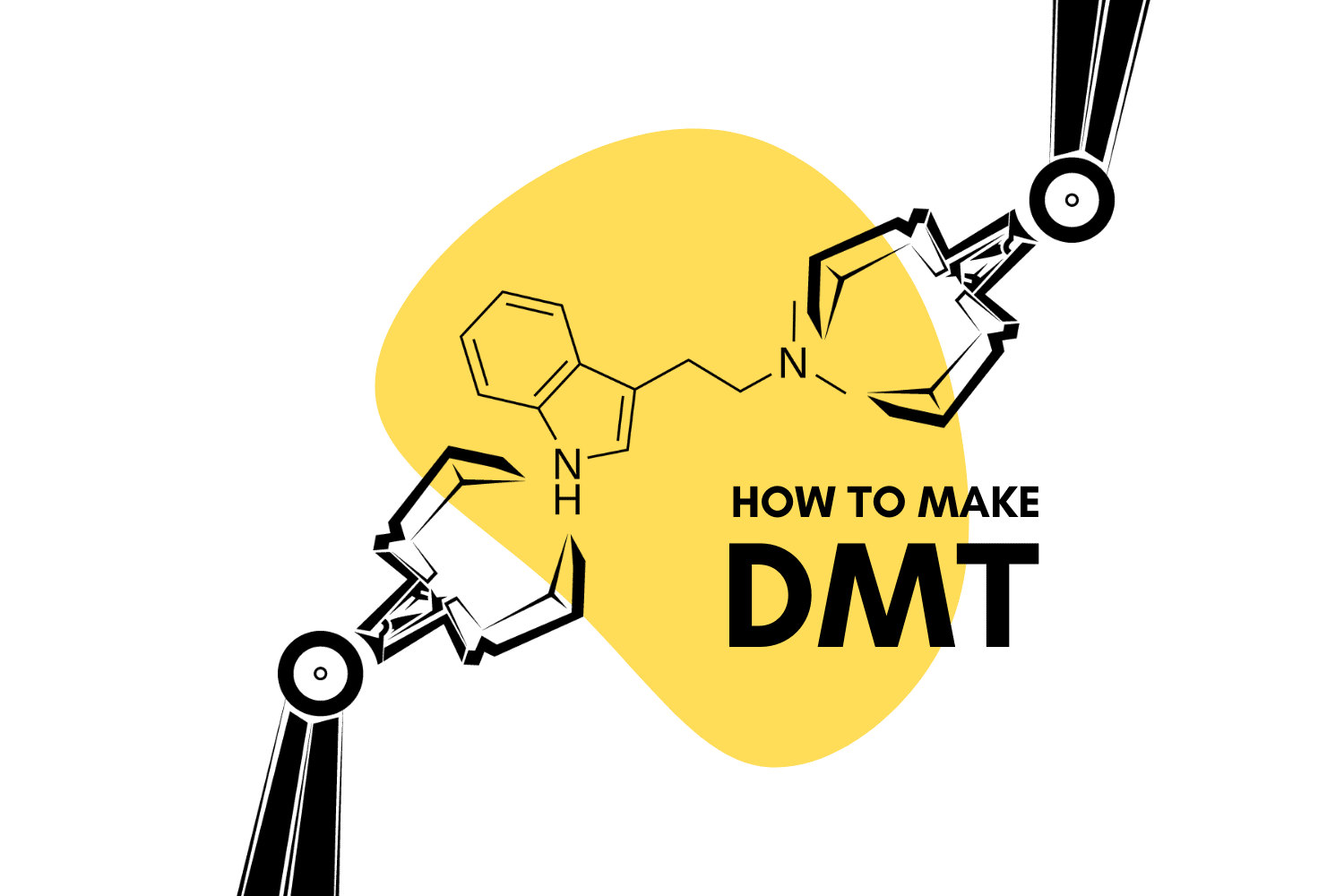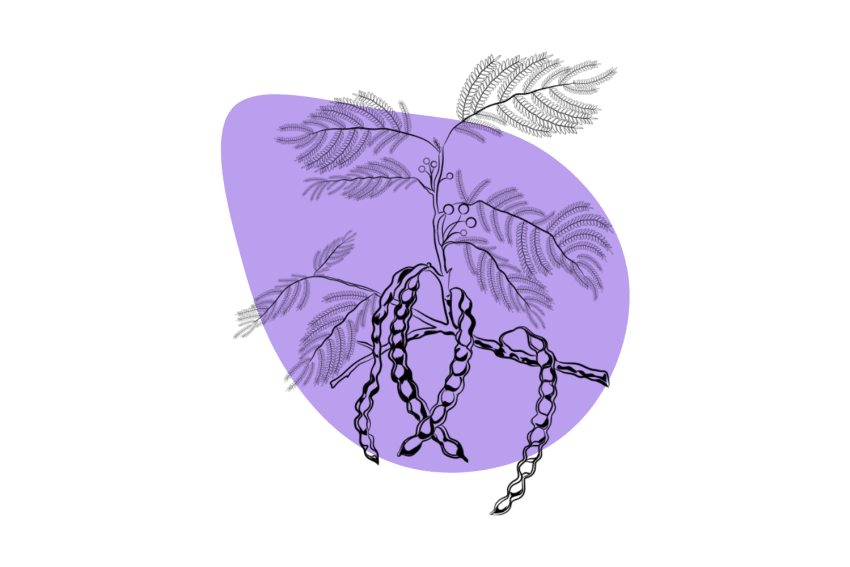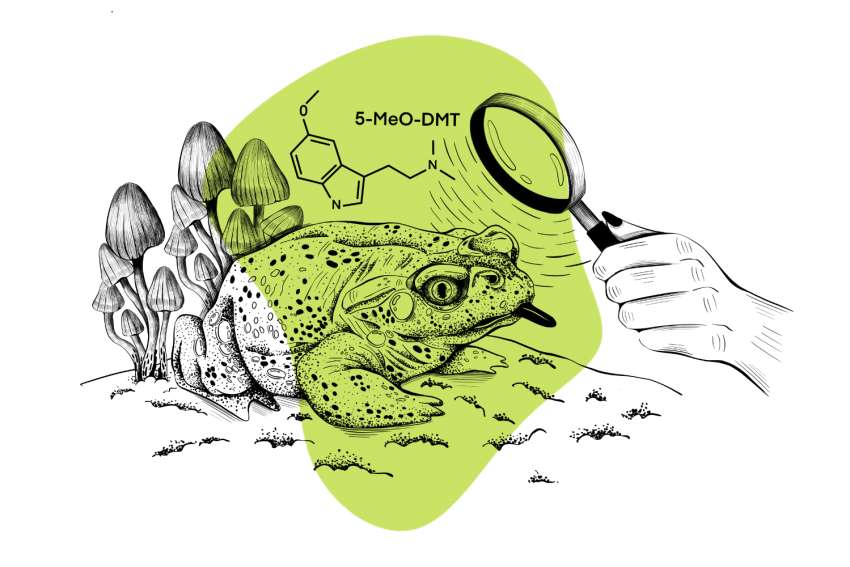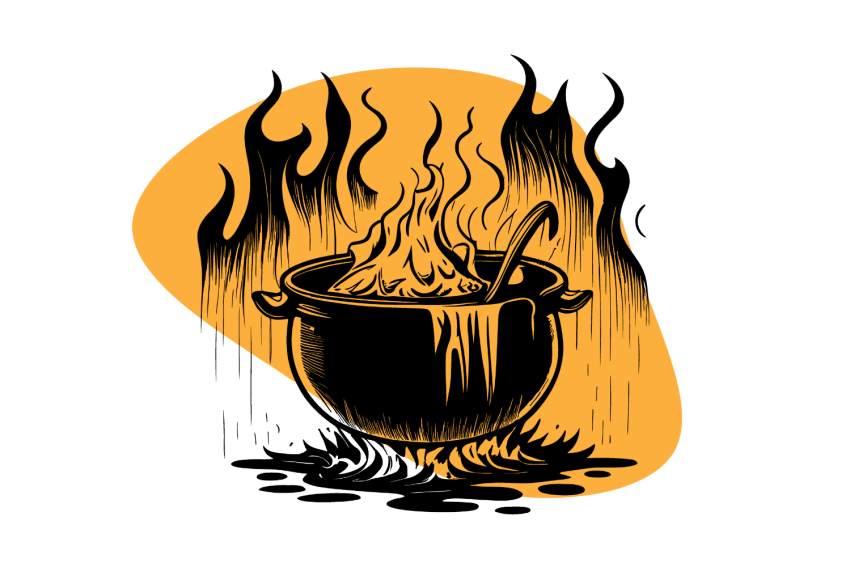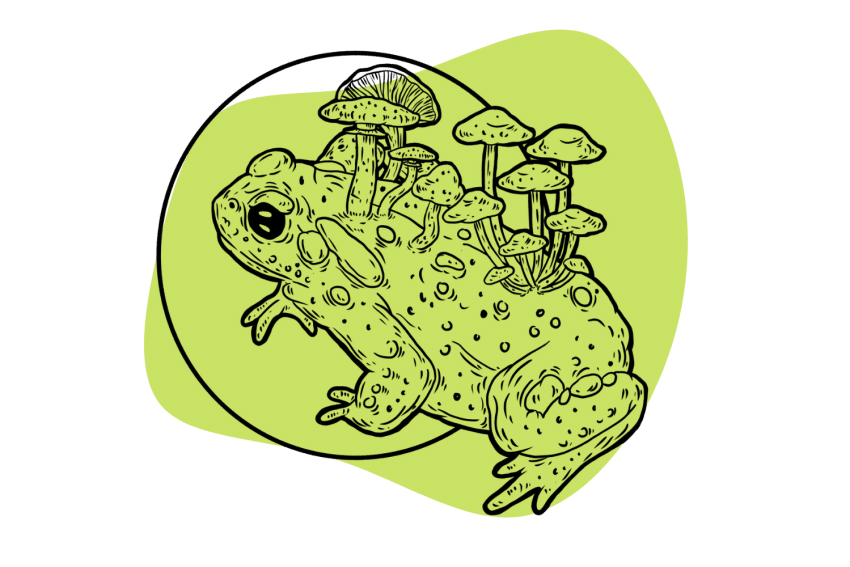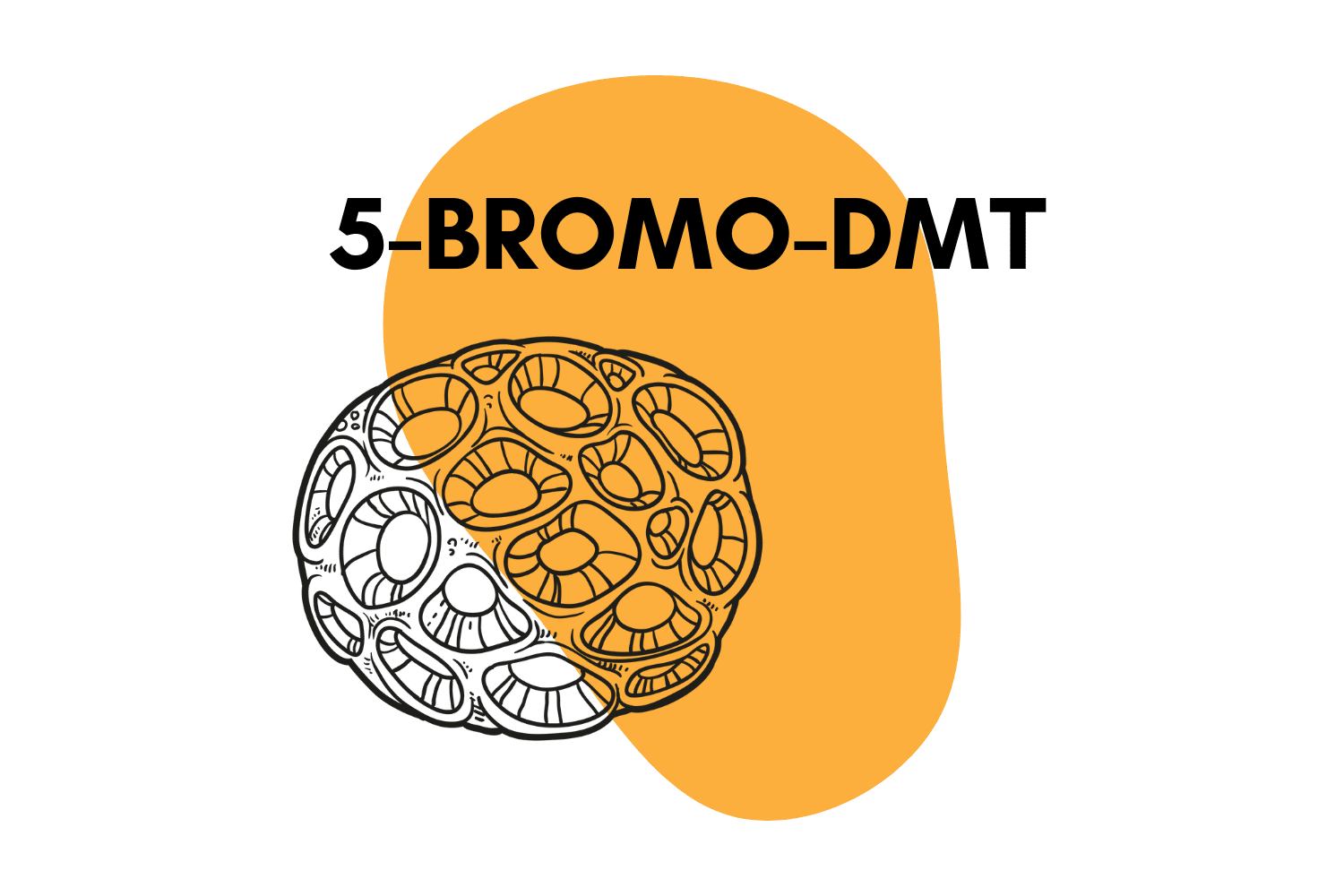What is DMT? (The Spirit Molecule)
DMT (dimethyltryptamine) is a naturally occurring psychedelic substance with structural similarities to serotonin. It’s one of the strongest (and shortest-lived) psychedelics on Earth.
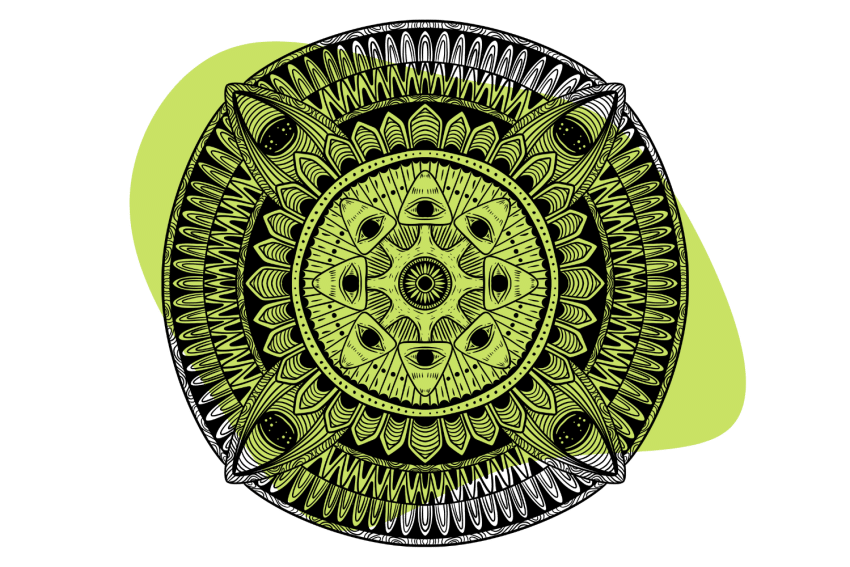
DMT (AKA the “spirit molecule”) is best known for its ability to induce dreamlike states of consciousness.
This naturally-produced molecule produces intense visions of bright kaleidoscope fractals and blurs the lines between what we consider “self” to be. It warps our perception of time and space, induces life-altering insights, and expands the mind in ways you would never have thought possible.
In this article, you’ll learn all about DMT. We’ll cover the three main types of DMT and what makes them different. You’ll also learn how to use DMT safely and when to avoid it.
Let’s start at the beginning.
Listen to this article:
What is DMT (Dimethyltryptamine)?
DMT is an acronym for N,N-dimethyltryptamine. It’s a naturally occurring alkaloid. Trace amounts of this molecule can be found in various plant and animal species. The human brain manufactures its own DMT in the pineal gland.
DMT is closely related to serotonin — one of the primary neurotransmitters in the brain.
Serotonin is responsible for regulating emotion, conscious thought, and much more. DMT is believed to play a similar role, and many experts believe it’s responsible for inducing dream states while we sleep.
But here’s the kicker — nobody actually knows what DMT is used for in the brain. It’s proven to be exceptionally difficult to study, and most of the theories around what the human brain uses it for is purely theoretical.
DMT, the drug, comes in a few different forms:
- A crystalline powder that can be smoked or vaped for a powerful hallucinogenic experience
- A semi-poisonous toad venom from Bufo alvarius (Colorado River Toad)
- A dark brown, bitter-tasting brew called ayahuasca
- A brownish herb mixture called change
- A fine brown powder called yopo that’s blown into the nostrils
- Various novel DMT research chemicals
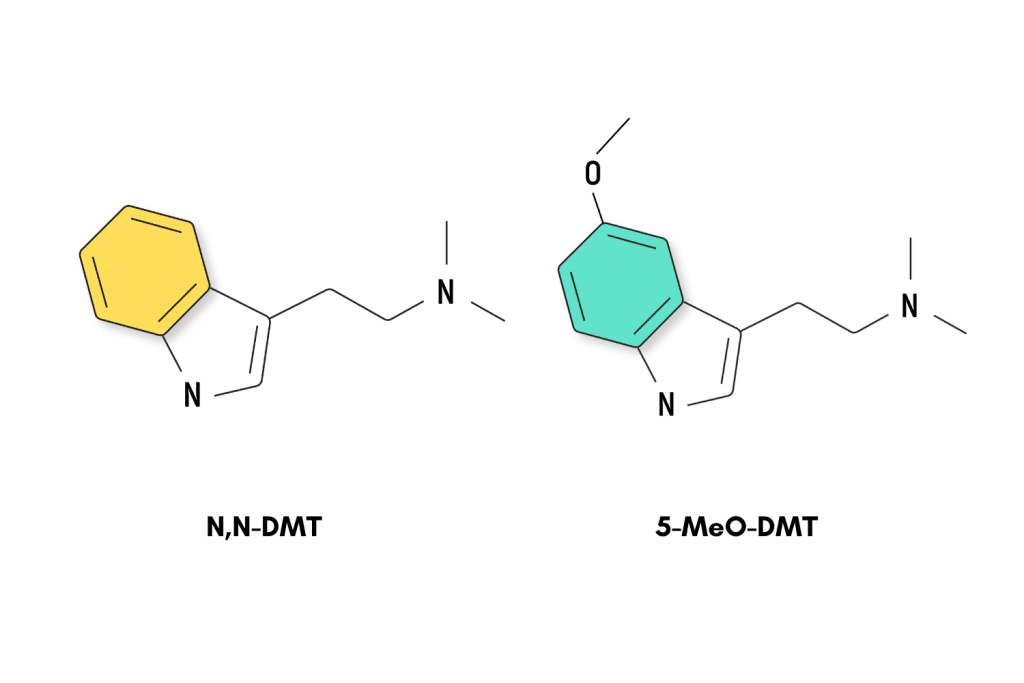
All forms of DMT are classified as a Schedule I drug in the United States — making it illegal to produce, possess, and use. The same sentiment is shared by most countries around the world.
Recently, some parts of the United States have started decriminalizing the substance. This doesn’t make it legal, but it removes the penalties for being in possession (more on this later).
DMT: Specs & Technical Details
| Chemical Name | N,N-Dimethyltryptamine |
| Level of Risk | Low |
| Street Names | Dimitri, The Spirit Molecule, God Molecule |
| Most Common Side-Effects | Anxiety, paranoia, & nausea |
| Duration of Effects | 30–60 minutes |
| Legality | Illegal Globally |
DMT: “The Spirit Molecule”
The abundance of this molecule throughout the natural world, along with its intense psychoactive effects, is what’s led to the common name — the spirit molecule.
Rick Strassman (one of the world’s leading researchers on DMT) suggests the first release of DMT in a growing fetus around the 7th week of pregnancy could indicate the “entrance of the spirit” into the body.
Likewise, DMT is released again at the time of death, which has many suggesting this molecule may act as both an entrance and an exit for the soul from the body.
Whether any of this is true or not remains up for debate.
There Are Several Different Types of DMT
Depending on the type of DMT, the experience can range anywhere from vivid fractal patterns to a complete dissolution of the mind and body.
While all DMT shares the same name, the effects can be exceptionally different from each other.
N,N-DMT
(N,N-Dimethyltryptamine)
This form of DMT is most abundant in the natural world — including the human brain. When you drink a brew of ayahuasca, this is the predominant form of DMT you’ll use.
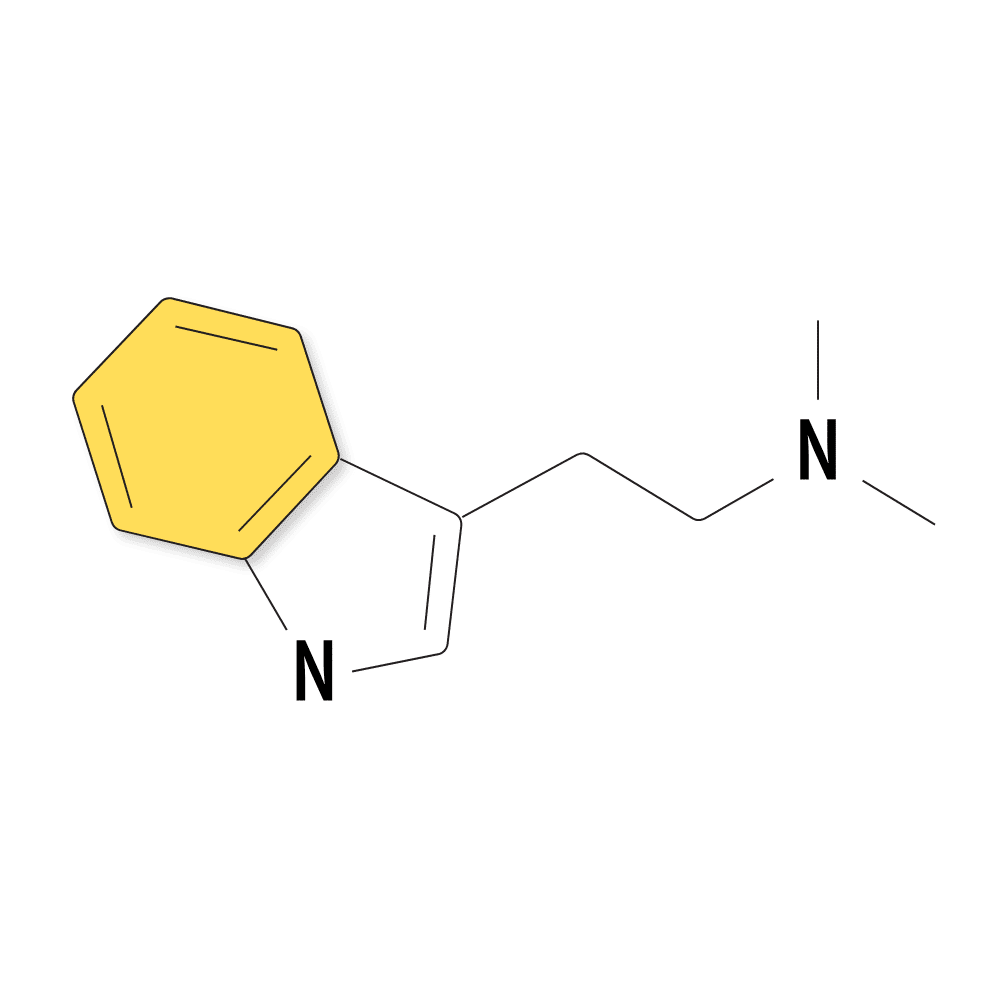
This form of DMT has a strong visual component but can also lead users to dissociate from reality.
Compared to the other forms of DMT, it’s somewhere in the middle regarding strength. 5-MeO-DMT is the strongest, while 4-AcO-DMT is the weakest.
5-MeO DMT
(5-methoxy-Dimethyltryptamine)
This form of DMT is differentiated from N,N-DMT by its short duration of effects (10 – 20 minutes in total) and extreme potency. 5-MeO-DMT is roughly six times as potent as N,N-DMT, and has much less of a visual component.
This version of DMT can be found in nature in a handful of plants such as Mucuna pruriens, Mimosa pudica, Anadenanthera peregrina (yopo), and a few species of cacti. It’s also found in a couple of mushroom species (Amanita citrina and Amanita porphyra) and some toads.
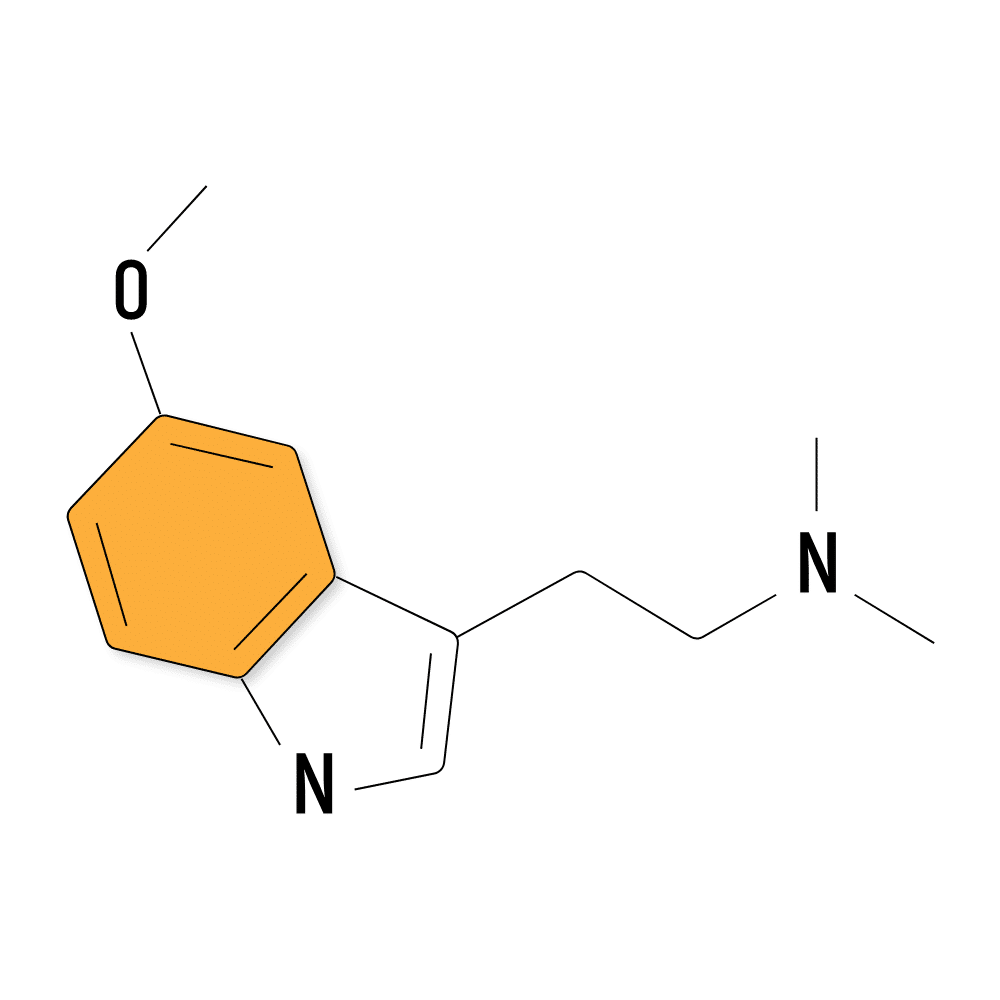
The most famous source of this type of DMT is the Sonoran Desert Toad (Bufo alvarius). This particular toad secretes 5-MeO-DMT, and a related compound called bufotenin as a defense mechanism to avoid being eaten by other animals. Along with DMT, these toads secrete a series of toxic compounds that can make using this toad dangerous if not prepared properly.
The use of these toads secretions or skin is a traditional sacrament called chansu. It involves ingesting or smoking the secretion to produce a psychoactive state.
5-MeO-DMT is also available in synthetic form, which can be snorted, smoked, or injected. This is the most sustainable, most affordable, and most common form of 5-MeO-DMT.
Oral forms of 5-MeO-DMT are also available but must be combined with an MAO (monoamine oxidase) inhibitor in order for it to work. MAO is an enzyme produced by the body that primarily works to break down neurotransmitters like serotonin and dopamine, but it also destroys DMT in the gut before it’s absorbed.
When combined with a compound that inhibits MAO, the effects of DMT appear within minutes. This quickly evolves into intense visuals and out-of-body experiences. Many users report living through several lifetimes after a single 15 minute trip on 5-MeO-DMT. Others experience contact with “beings from other realms,” or intense introspection or ego death.
4-AcO DMT
(4-Acetoxy-N,N-dimethyltryptamine)
4-AcO-DMT is more closely related to psilocin — the active ingredient in magic mushrooms — than it is to the other forms of DMT. In fact, this compound is considered a prodrug of psilocin.
This means 4-AcO-DMT is converted into psilocybin by the body. The majority of this drug’s effects begin once it’s converted into psilocin by the liver. However, it also has some psychoactive effects on its own. Users who smoke 4-AcO-DMT report mild to moderate psychoactivity beginning within seconds. These effects can only come from the drug itself since inhalation bypasses first-pass liver metabolism — meaning it hasn’t yet been metabolized by the liver.
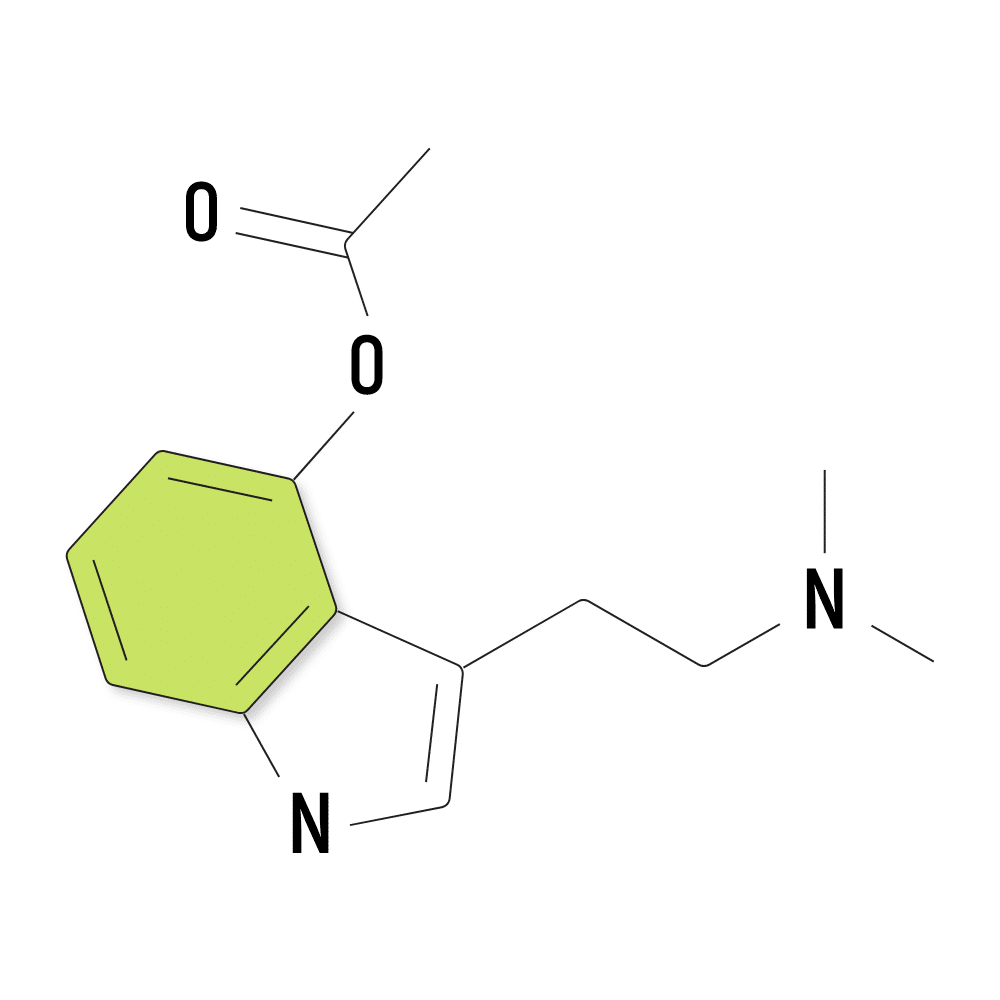
This form of DMT is not found in nature. It’s a semi-synthetic molecule, which means it’s made by modifying other compounds in a lab setting.
The effects of this psychedelic are very similar to magic mushrooms. It produces distortions in visual and auditory sensation, induces states of introspection, and can result in separation from ego in higher doses.
5-Bromo-DMT
5-Bromo-DMT (AKA. “SpongeBob DMT”) is a lesser-known form of DMT found in three species of sea sponge.
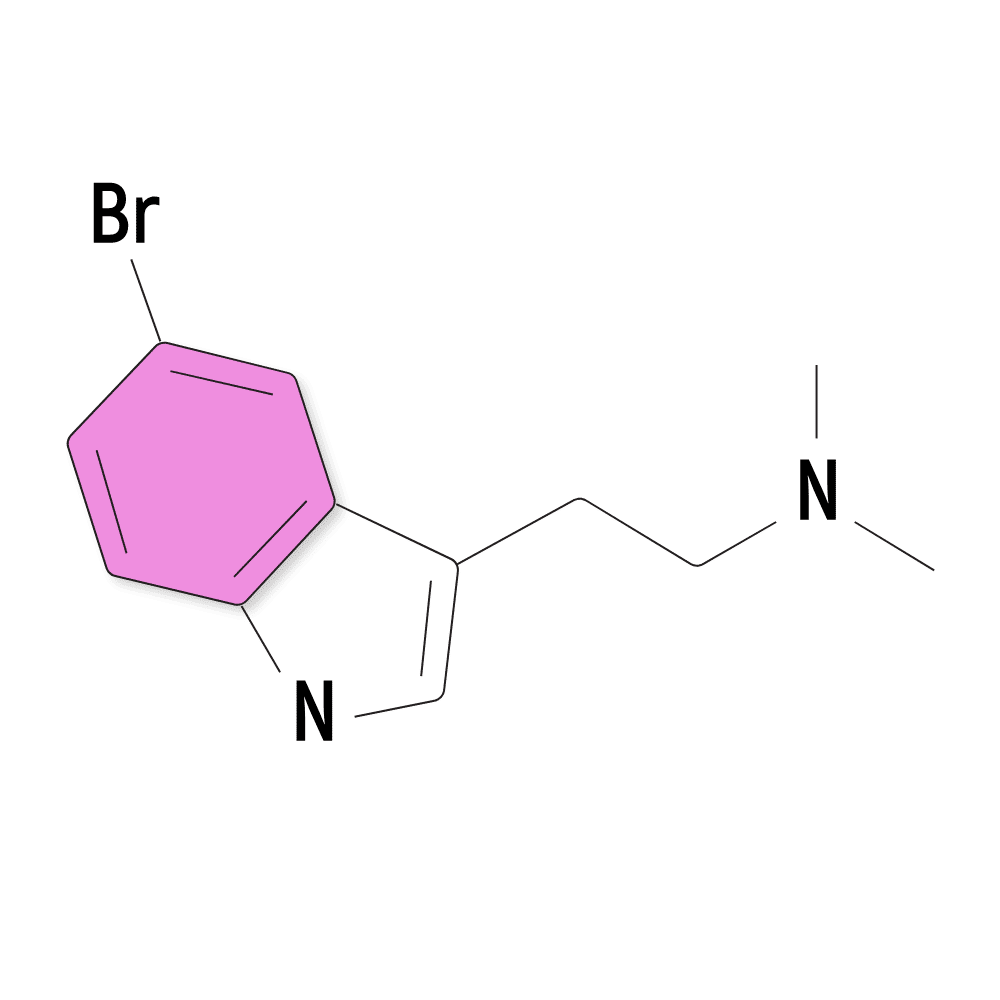
This type of DMT only has mild psychoactivity but shares similar effects of low-dose N,N,DMT or 5-MeO-DMT. The effects are best described as lucid — rather than psychedelic like the other main forms of DMT.
Ayahuasca
Ayahuasca is a traditional plant preparation from the Amazon rainforest. It involves the combination of two plants — the ayahuasca vine, and then either Mimosa pudica or Psychotria viridis.
The active ingredient in ayahuasca is DMT, which is presented in the forms of N,N-DMT, as well as a weaker source of 5-MeO-DMT.
The first component of ayahuasca is a plant high in DMT. The most common plant is Mimosa pudica, but other species can also be used depending on what’s locally available.
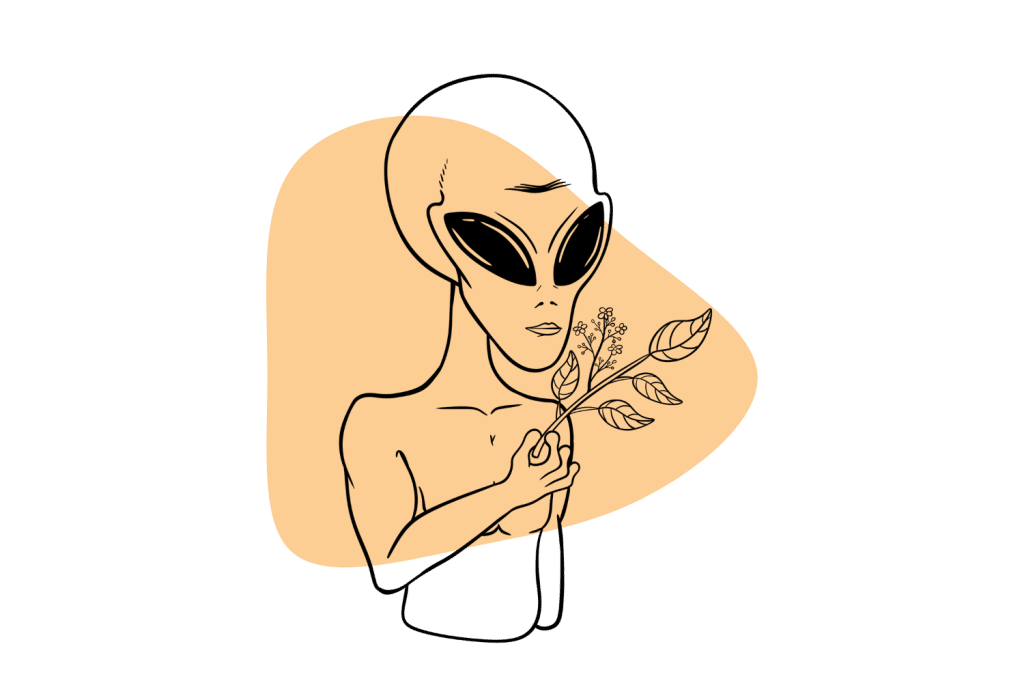
The ayahuasca vine (Banisteriopsis caapi) is then added to the brew as a source of MAO inhibition.
MAO is an enzyme in the body that breaks down DMT almost immediately. Consuming a brew of pure Mimosa pudica would have no hallucinogenic effects — but when combined with the ayahuasca vine to prevent the breakdown of DMT, it produces one of the most powerfully psychoactive substances on earth.
What’s The Dose of DMT?
DMT is extremely potent — only a very small dose is necessary to profoundly impact perception and thought. The dose depends on the type of DMT being used, as well as the mode of administration.
Inhalation and injection require the smallest doses, while oral and insufflation require much larger doses to produce similar effects.
It should also be noted that for oral DMT to work, an MAO inhibitor should be used simultaneously. Ingesting pure DMT without an MAO inhibitor will have little to no effect on the body.
| Type of DMT | Oral Ingestion | Insufflation (Snorting) | Inhalation (Smoking or Vaping) |
| N,N-DMT | N/A | 15–50 mg | 10–25 mg |
| Synthetic 5-MeO-DMT | N/A | 8–15 mg | 5–12 mg |
| Toad Venom (5-MeO-DMT) | N/A | N/A | 30–60 mg |
| 4-AcO-DMT | 8–20 mg | 15-25 mg | N/A |
| Ayahuasca | 0.6–0.85 mg/kg DMT equivalent | N/A | N/A |
What Does DMT Feel Like?
What a question. If you ask anybody who’s used DMT what it feels like, you’re likely to get inundated with stories involving death and rebirth, separation from reality, contact with otherworldly beings, and altered perception of time.
We asked our readers to submit their DMT experiences in order to better understand how DMT feels like. What we learned is that the DMT experience is infinitely random. Everybody’s experience is completely different.
If you’re interested in reading some user experiences of people using DMT, check out some of the posts in the /r/psychonaut Reddit — such as this one involving alien doctors.
The effects of DMT can be intense. Your experience can range from being profoundly positive to terrifying.
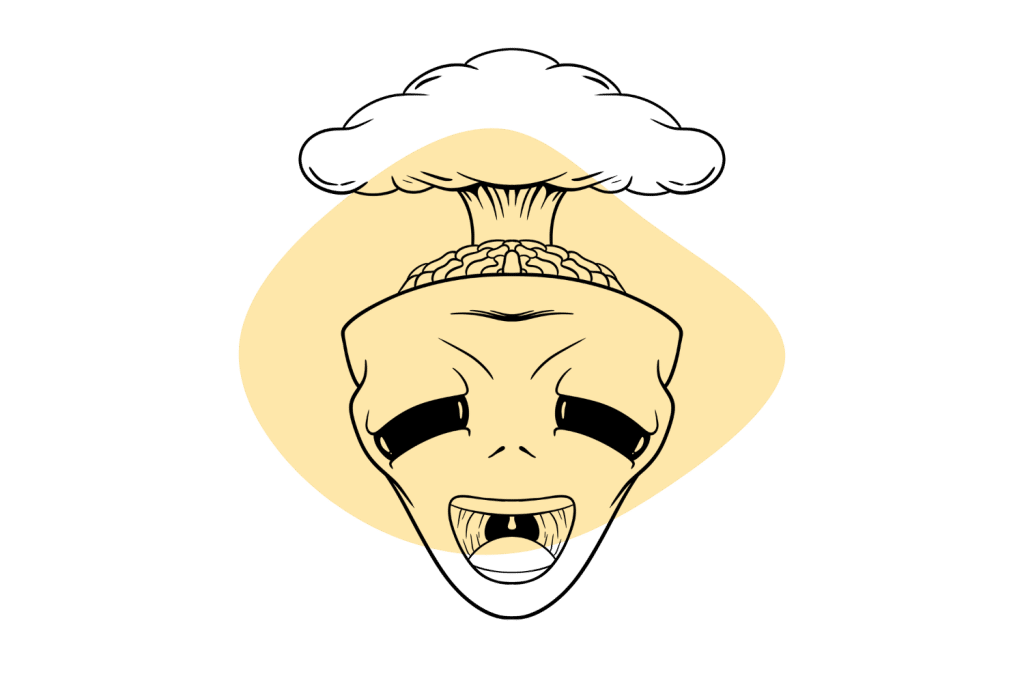
Most people who use DMT consider it to be one of the most significant experiences of their life — often prompting a major shift in thinking. People have changed careers, quit drugs and alcohol, or moved abroad due to using DMT.
Others have experienced scary or uncomfortable visions of alien abduction or ego death.
While the effects of DMT are short (especially 5-MeO-DMT), the user often experiences a decoupling with time during the trip. It’s not uncommon for someone to come out of a 10 minute DMT trip after experiencing what feels like a lifetime (or several lifetimes) within the trip itself.
Common experiences from DMT include:
- Alien abduction or contact with otherworldly beings
- Altered perception of time
- Distortions in color, sound, and texture
- Ego death and dissolution
- Fractal or kaleidoscope vision
- Light trails or double vision
- Out-of-body experiences
- Unexplainable coincidences
How Long Do the Effects of DMT Last?
DMT itself has a very short duration of effects. It’s rapidly metabolized and removed from the body by the joint efforts of the liver and kidneys.
Smoked or injected DMT only lasts about 30 minutes before concentrations drop so low it no longer has any effect on the body. You’ll usually start to feel the effects of DMT in these forms within a few seconds, which peak around the 10-minute mark. You may lose consciousness for a few minutes before being forced back to reality a few minutes later, almost completely sober.
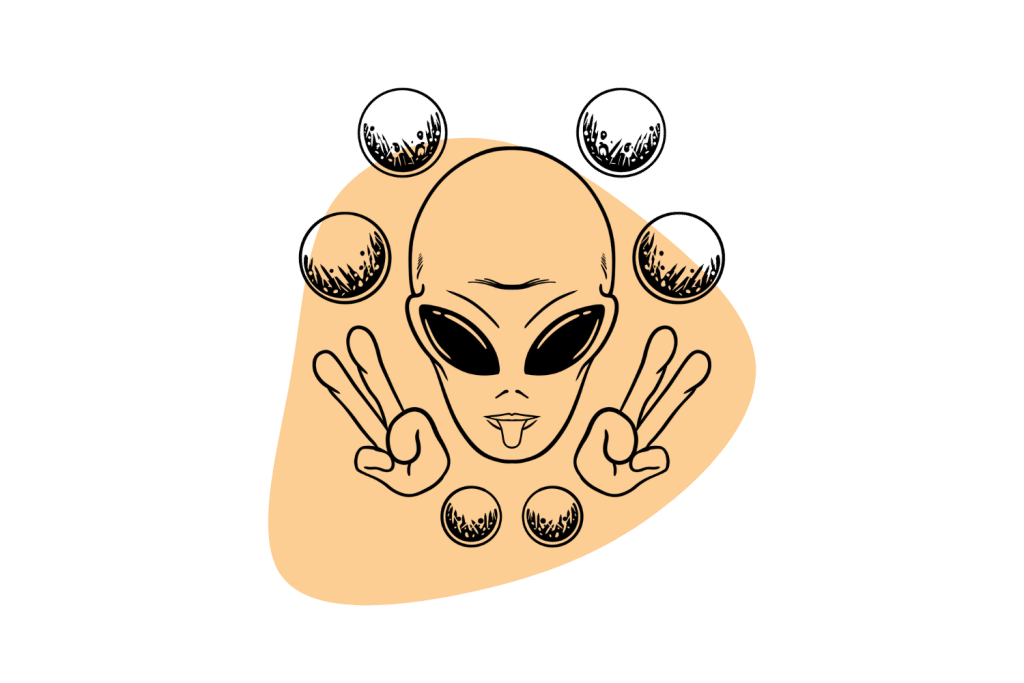
Oral forms of DMT, such as ayahuasca, last much longer because of the added MAO inhibitor that comes along with this form of the drug. MAO is required to metabolize DMT, so blocking the effects of this enzyme prevents it from being metabolized. The duration of effects come down to the duration of the MAO inhibitor, more so than the duration of effects from DMT.
Ayahuasca usually takes about an hour to take effect, peaks by around 90 minutes, and then slowly taper off over the course of about 6 hours.
What is Ego Death?
The ego is described as the combination of three elements:
- Self-image — the view someone has of themselves
- Self-esteem — the value someone has for themselves
- Self-identity — the beliefs and ideologies an individual holds
In essence, “ego” refers to our experience of “self” — who we are and what we believe. It’s a tool we use to quantify the experience of life and reality. This concept is used to differentiate “self” from “other.”
Our ego is generally a good thing — it helps catalog and organize our experiences to help filter through the endless stream of information we’re exposed to on a daily basis — most of which is irrelevant. It also helps us separate opposites — such as good and evil, right and wrong, or love and hate.
Ego death is a complete loss of subjective “self.” The lines between”self’ and “other” become blurred and may no longer be recognizable. Without an ego, we’re given a completely unbiased view of the world. It can be said that ego death creates a state where you’re more spontaneous and in the moment. We feel more connected with the world around us and take on a more objective view of the world.
Experiencing ego death is one of the primary reasons people seek out the assistance of psychedelics, but it can also be achieved in fleeting moments through meditation or breathwork.
Ego death can feel scary at first. Our entire basis of reality comes from our understanding of self and others. Losing a grasp on the differences between the two can be terrifying — especially the first time it happens. It can feel like you’re actually dying.
The feeling of death and rebirth are extremely common when using DMT — which is a direct result of what we consider “ego death.”
Also see: 32 Psychedelic-Inspired Movies & Documentaries To Expand Your Mind.
DMT & The Default Mode Network (DMN)
From a scientific perspective, ego death is a dampening of the default mode network (DMN) — which is thought to be responsible for maintaining our perception of time, memory formation and retrieval, and the ability to separate self and others.
The DMN is involved with repetition tasks as well. It’s used to make the things we do more efficient. Have you ever left your house and then suddenly wondered if you’ve locked the front door?
Chances are you did, but it was so automatic you weren’t even paying attention when you did it. This is a direct result of the DMN taking control of our automatic thought processes.
Psychedelics like DMT are thought to “reset” the DMN.
This resetting of the DMN is thought to be the reason DMT and other psychedelics can lead to such dramatic shifts in perception and breaking of old habits or ideologies.
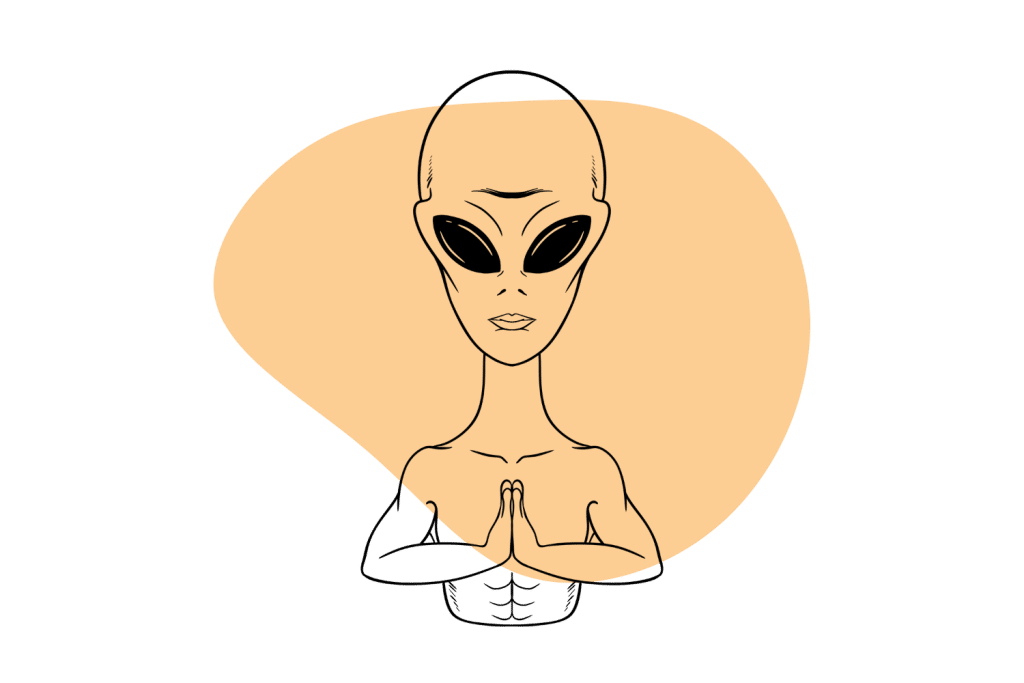
A good example of this is drug addiction. Users may feel both physically and mentally addicted to a substance. They can’t break the cycle of addiction because their DMN is conditioned to using the drugs whenever they feel stressed or sad.
Resetting the DMN is often enough to break this cycle, allowing addicts to go through the process of detoxing and breaking the addiction without the burden of habitually returning for the drug when in need of a coping mechanism.
How Strong is DMT Compared to Other Psychedelics?
DMT is one of the most powerful psychedelic compounds on earth. N,N-DMT (found in ayahuasca) is rated at an 8 out of 10 on the psychedelic scale, while 5-MeO-DMT falls closer to 10/10.
So how does DMT compare to other psychedelics?
DMT vs. LSD
DMT and LSD (lysergic acid diethylamide) share a similar structure, and both interact with the 5HT2A receptors to produce most of their psychedelic effects.
In general, the effects of both of these drugs are very similar, but DMT is stronger from a psychoactive perspective. You’re much more likely to have an out-of-body experience on DMT than LSD.
DMT vs. Psilocybin
N,N-DMT, and 5-MeO-DMT are very different from psilocybin (magic mushrooms) and psilocin in their effects. Psilocybin is known for producing a stronger “body high” with fewer visual components.
These forms of DMT, on the other hand, have a stronger visual component and out-of-body experiences.
4-AcO-DMT is the exception here. Its effects are very similar, if not identical, to psilocybin.
DMT vs. Ketamine
Ketamine works through completely different receptors compared to DMT, and therefore the effects are going to be very different. Ketamine is classified as an arylcyclohexylamine and is most similar to PCP, DCK.
Both DMT and ketamine can produce out-of-body experiences, but there are a lot of differences between the two. The DMT experience is otherworldly and highly introspective at times. Ketamine, on the other hand, is best described as “shadowy” or “muffled.” It numbs the body and makes you feel as though you’re more of a spectator than experiencing the trip firsthand. It’s effects are classified as dissociative.
In lower doses, ketamine feels very different and has much less visual component than DMT.
DMT vs. Mescaline
Mescaline has similar hallucinatory effects as DMT, but with a twist. This compound interacts much more strongly with the dopamine receptors, rather than focusing specifically on the serotonin receptors like DMT, LSD, or psilocybin.
So what does this mean in terms of effects?
Mescaline has a strong visual component and can result in a lot of introspective thoughts — but even in high doses, mescaline users remain coherent and clear-headed. Thoughts can be chaotic at times, and the change in perception can affect how we experience time, but at no point do we leave the body or experience ego death.
Is DMT Safe?
Physically, DMT is very safe. The lethal dose of this substance is so high it’s virtually impossible to achieve without injecting very large doses through an IV. In fact, nobody has ever been given a lethal dose of DMT to date.
With that said, there are some potential risks to using DMT, especially if used in combination with other drugs or alcohol.
There are also psychological risks to using DMT that could result in lasting side effects in susceptible individuals. For example, DMT has been reported to aggravate existing psychological disorders such as schizophrenia or psychosis.
In exceptionally rare instances, some users experience a condition called hallucinogen persisting perception disorder (HPPD), which can result in long-term changes in visual or auditory perception.
Bad trips can also lead to harm. While this is extremely uncommon, there have been reports of people experiencing a bad trip who ended up jumping from a building, running into traffic, or inducing self-harm in other ways.
Bad trips can be terrifying and leave a lasting impression. PTSD, anxiety, and depression are all potential side effects of particularly bad trips.
Whenever using any psychedelic substance, it’s important to treat it with a great deal of respect. These substances can be exceptional tools for expanding the mind and improving our experience here on earth — but they also open us up to risk if used irresponsibly.
Always check with your doctor before trying a psychedelic of any kind if you have underlying health issues or take prescription medications.
→ Learn about psychedelic-assisted psychotherapy
Side Effects of DMT (During The Trip)
- Hallucinations
- Dissociative thoughts
- Anxiety and paranoia
- Dilated pupils
- Increased heart rate and blood pressure
- Dizziness or lightheadedness
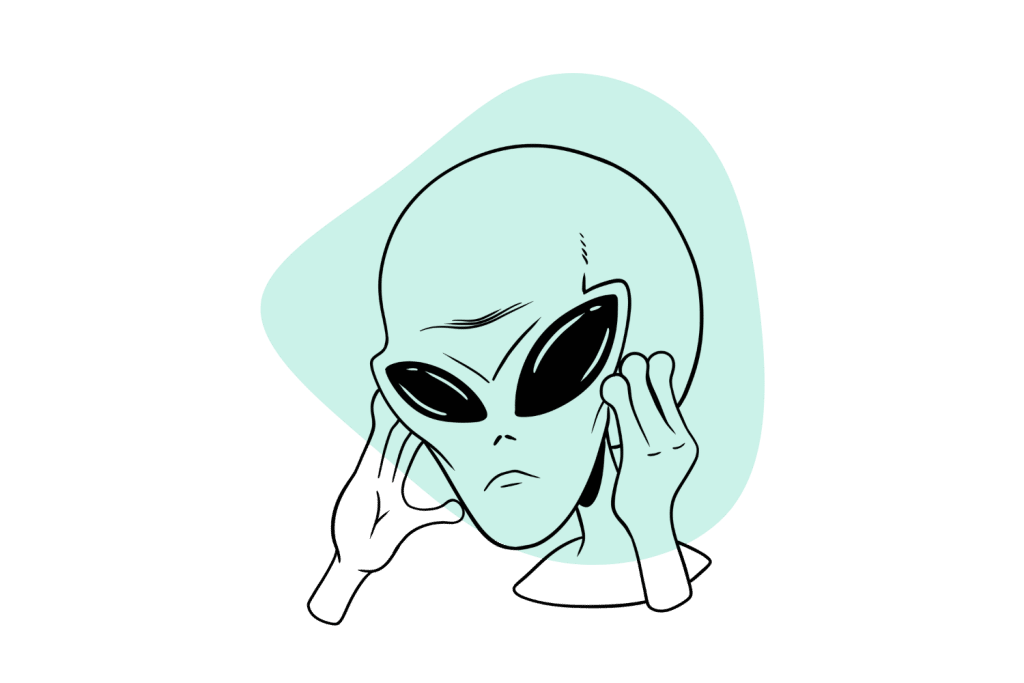
Dealing With a Bad Trip on DMT
Unpleasant thoughts, feelings, and hallucinations can arise while using DMT. These experiences are referred to as a “bad trip” — which can be extremely distressing.
During the trip, events taking place look and feel real.
While there’s no way to “stop” the trip, there are ways to turn a frightening or uncomfortable experience into something more positive. Taking steps as simple as listening to soothing music, lying down on your back, practicing breathing techniques or mediation, or leaving the current room you’re in can be enough to break the cycle and help you return to a more relaxed state.
Having a close friend or family member (who’s sober) nearby is the best way to help navigate a bad trip. They can help console and anchor you back into reality by comforting and reassuring you that everything is fine. This concept is referred to as a “trip sitter” — someone who sits in on your trip to help keep you safe from harm and navigate bad trips if they occur.
Having a trip sitter who’s experienced with psychedelics is one of the fundamental steps to using psychedelics responsibly.
One of the most effective methods of dispelling a bad trip is acceptance. This concept is much easier said than done but is an extremely effective tool that can be learned over time. Accepting your fate and allowing the thoughts of fear and anxiety to overtake, you can actually lead you through the tunnel much faster.
A lot of the fear and anxiety that accompanies a bad trip comes from resistance to the drugs’ effects. As we lose control over our reality, our mind wants to resist these changes and retain control.
Surrender and embrace it — you’ll end up in a better spot much quicker if you can learn to do this.
Is DMT Legal?
DMT is illegal throughout most of the world. In the United States, it’s considered a Schedule I drug — which means it’s illegal to possess any quantity of the drug at any time. This includes ayahuasca.
There are a couple of exceptions to this rule:
1. Convention on Psychotropic Substances — This is a United Nations treaty signed in 1971 that allows nations to exempt certain psychoactive substances from the prohibited status if used in a traditional or religious context.
In the United States, there are two groups that have been granted this exception — Santo Daime and União do Vegetal. Both of these groups use ayahuasca and other psychoactive substances as part of their traditional sacrament.
2. Recently Oregon passed Measure 110 — which decriminalized small quantities of all illicit substances — including DMT. This doesn’t mean DMT is legal, but it significantly reduces the risk of jail time and fines if caught with substances like DMT.
3. Washington DC is also on the ballot for decriminalizing all psychedelics — including DMT.
Outside of specific exceptions, it’s wise to assume that DMT is completely illegal. In many parts of the world, it’s punishable with jail time if caught in possession of DMT in any form.
Suggested Reading: Legalization vs. Decriminalization: What’s the Difference?
Psychedelic Research on DMT
Most of the available research on the therapeutic effects of DMT comes from studies on the traditional shamanic brew, ayahuasca [11].
DMT For Depression
Ayahuasca use has been shown to result in reduced ratings of “hopelessness” [12].
Other studies have shown dramatic improvements in depression scores lasting 21 days (or more) from a single dose of ayahuasca [13].
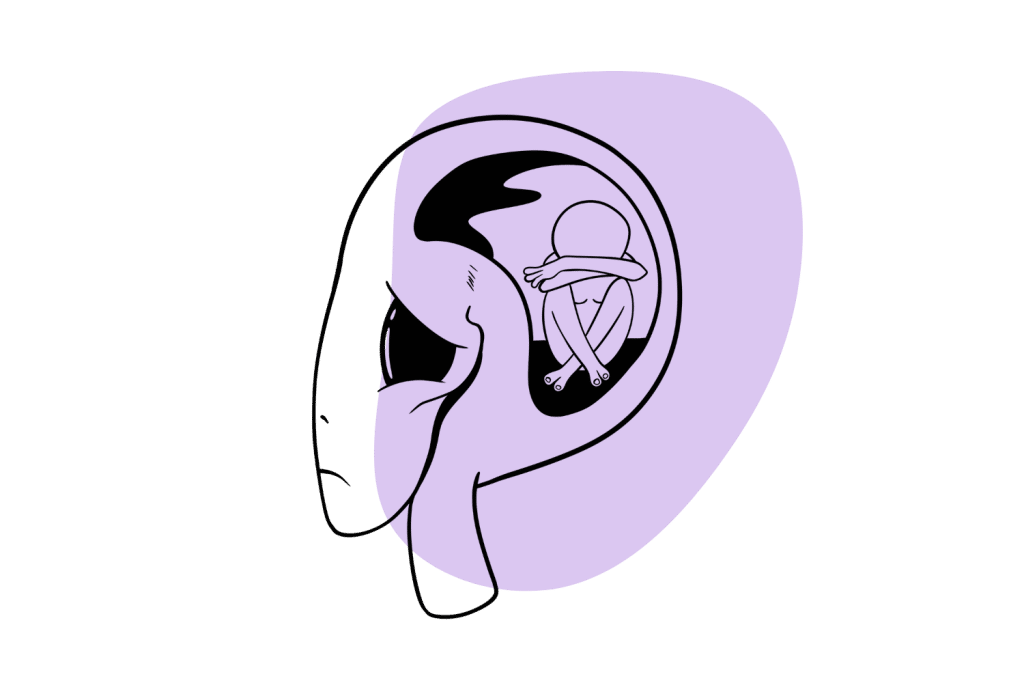
This research suggested DMT may offer significant long-term support for chronic depression. With that said, this research involving ayahuasca instead of pure DMT introduces some questions. Ayahuasca doesn’t contain just DMT; it’s also abundant in harmaline alkaloids as well — which are potent MAO inhibitors and have been shown to have direct antidepressant benefits of their own.
It’s also unclear whether the psychedelic trip itself (along with the introspective insights that come along with it) is responsible for the antidepressant action or if the physiological effects of DMT are responsible.
DMT For Addiction
There are no current studies available on the impact of DMT on treating addiction. However, there are a lot of studies highlighting this use for other psychoactive substances like psilocybin and LSD — both of which activate the same receptors as DMT.
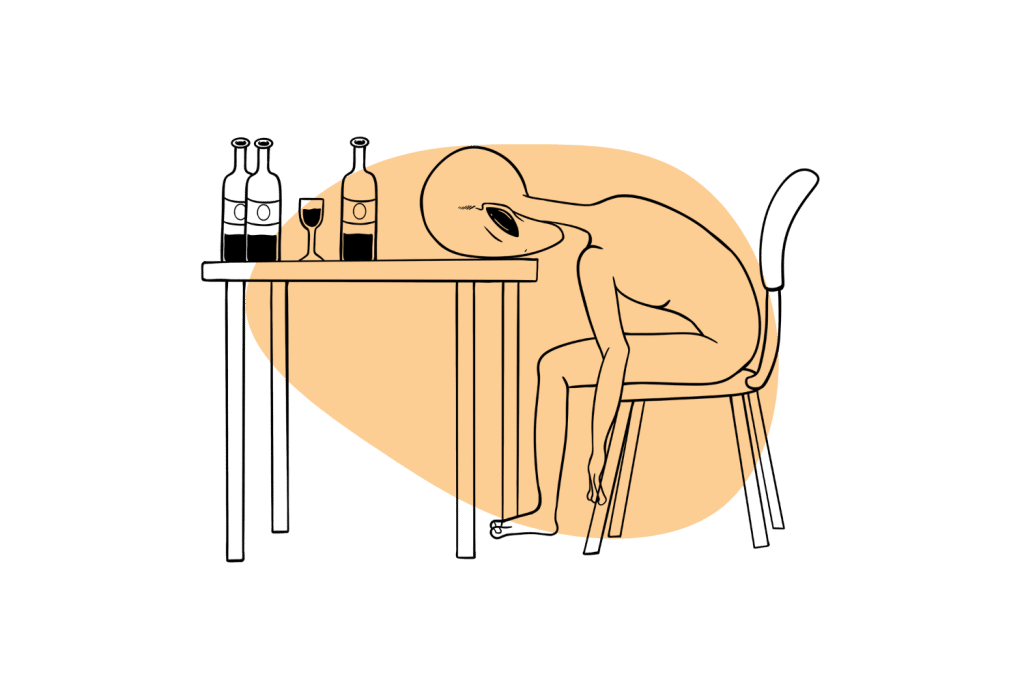
Virtually all of the serotonin-dependant psychedelics (LSD, psilocybin, and mescaline) have shown impressive effects on alleviating addictive tendencies [14]. DMT is a particularly interesting option because of its short duration of effects. It’s much more reasonable to administer DMT that lasts 15 – 30 minutes in an office setting compared to LSD or psilocybin — both of which can last several hours.
How DMT Works
DMT acts like the neurotransmitters glutamate and serotonin. It interacts with various receptors in the brain that cause a shift in neurochemical balance — producing what we experience as an altered perception of reality.
Serotonin Receptors
DMT works by interacting with our serotonin receptors — specifically through its effects on the 5HT2A receptors — which is the mechanism shared by most psychedelics (LSD, mescaline, MDMA, and psilocybin).
Serotonin is involved with numerous activities in the brain — from regulating mood and emotion to regulating the default mode network (DMN).
The subtle differences between different psychedelics come down to the overflow effects these drugs have on other receptors. Some of these receptors have a stronger impact on visual perception, others on mood or regulation of the DMN.
DMT, in particular, has been shown to interact with the 5-HT1A, 5-HT1B, 5-HT1D, 5-HT2A, 5-HT2B, 5-HT2C, 5-HT5A, 5-HT6, and 5-HT7 receptors [2].
TAAR1 Receptors
DMT has also been shown to activate the TAAR1 receptors [3] — which are intimately involved with the regulation of neurotransmitters like dopamine in the brain. The impact of DMT’s ability to activate the TAAR1 receptors is still poorly understood, but it’s believed this interaction plays a key role in the anti-addictive qualities of DMT.
The Sigma-1 Receptors
DMT also activates the sigma-1 receptor — which is a chaperone between the endoplasmic reticulum and mitochondria inside our cells.
The sigma-1 receptor is used to transfer stress from the ER to the nucleus. It’s thought that this interaction of DMT can enhance the production of anti-stress proteins and mitigate oxidative or hypoxic damage [4].
This is also thought to be the primary mechanism involved with the increased expression of BDNF (brain-derived neurotrophic factor) — which is associated with increased neuroplasticity after using DMT [5]. Other reports suggest the sigma-1 receptor plays may help to improve focus and memory [6].
Undiscovered Hallucinogenic Receptors
Most of the psychoactive effects of DMT come from activation of the 5HT2A receptor — but this isn’t the whole story. There have been several prominent researchers that suggest there may very well be another yet-to-be-discovered “hallucinogen” receptor [7, 8, 9].
DMT Metabolism
Metabolism refers to the enzymatic modification of compounds in the body. Virtually any drug, medication, or supplement is metabolized by the liver — converting it into something that’s easier for the kidneys to remove from the body.
DMT is rapidly metabolized by the body. Peak levels are reached within 15 minutes and are found below detection levels within 1 hour. Only 0.16% of intramuscular DMT injections remain in the blood after 24 hours [1].
Oral DMT is metabolized even faster. Once this compound is absorbed through the gut, it’s almost completely deactivated by first-pass liver metabolism. The only way for oral DMT to work is if it’s used with a potent MAO inhibitor.
DMT is metabolized almost exclusively by monoamine oxidase A. This enzyme is tasked with breaking down all the monoamine-based neurotransmitters, including serotonin, noradrenaline, and dopamine.
How is DMT Used (And how to Use it Safely)
As we’ve already touched on several times throughout this article, there are many different ways to use DMT.
Here’s a quick breakdown of each method, along with the pros and cons of each:
Smoking
Pure crystalline DMT can be smoked in a pipe or bong relatively easily. This method produces virtually immediate effects lasting around 15 minutes. Smoking DMT is very harsh on the lungs and tastes a lot like burning plastic.
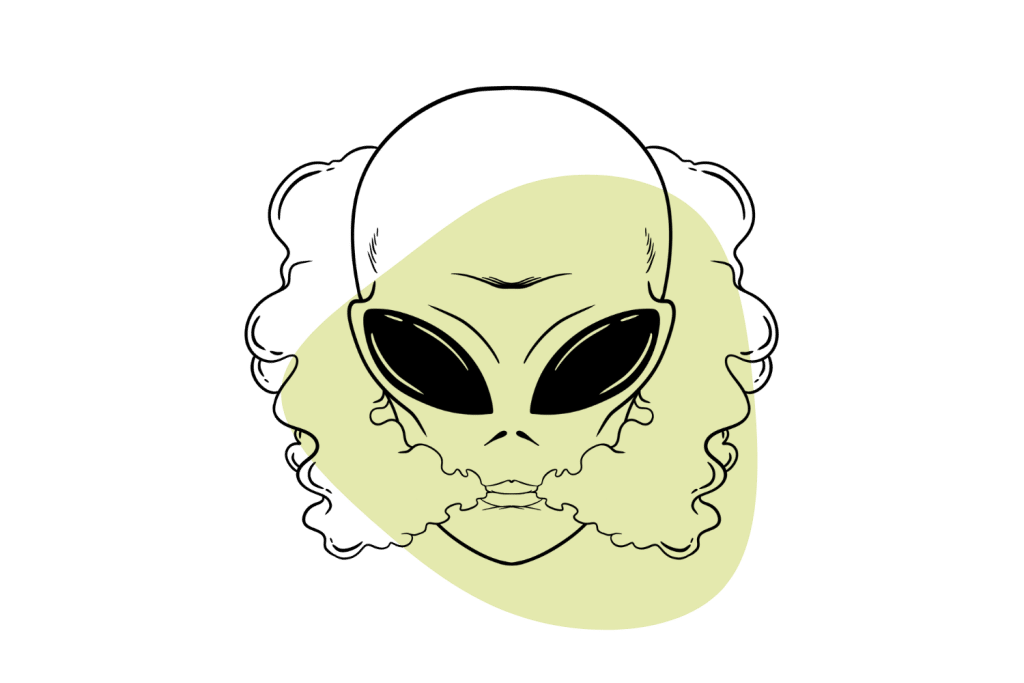
Vaping
DMT vape pens were a huge improvement to smoking it. This form of using DMT is much more gentle on the throat and lungs. The problem is that these devices are completely illegal, so the only place to get them is through black market sources. This isn’t recommended because you have no way of knowing what’s actually inside the device. The only way to be certain your pen contains pure DMT (along with the vape oil base, of course) is to make it yourself.
It’s actually pretty easy to make your own DMT vape pens, so if this is a method you’d like to explore, check out some of the available recipes online.
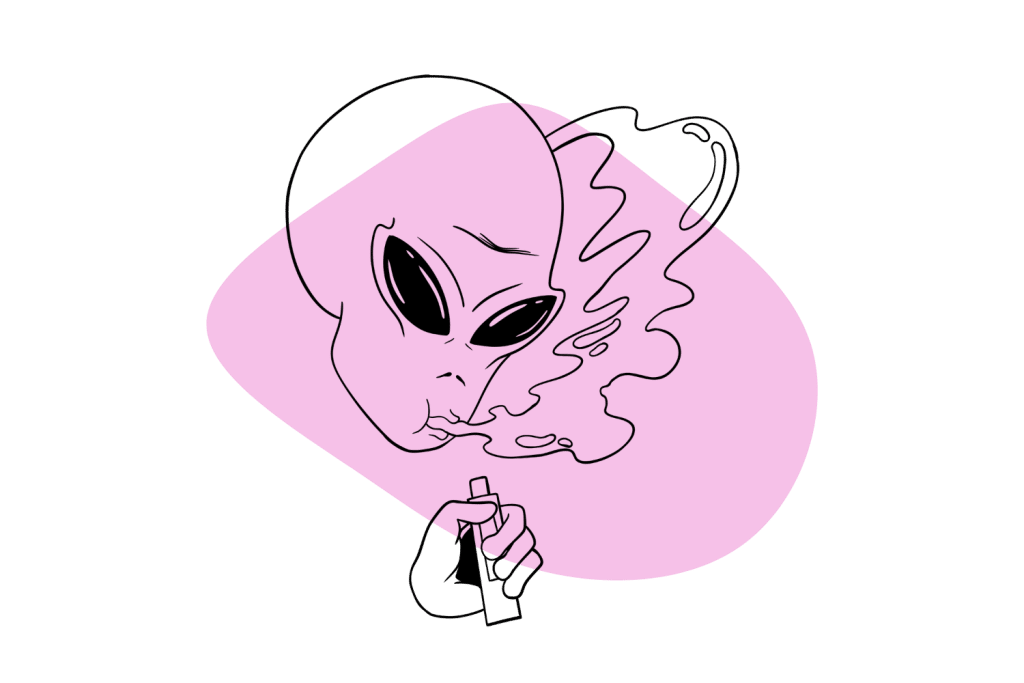
Injecting
Injecting DMT is the most common method used in scientific research. It offers immediate effects, has a short duration of effects, and allows doctors and medical researchers to administer consistent doses of DMT from one patient to the next.
The problem, of course, is that injecting any drugs without proper medical knowledge regarding cleanliness and safe administration can be very dangerous. Intramuscular injections are much safer than intravenous injections, but we still recommend steering clear of the injectables unless you’ve got access to medical facilities to do the injection for you.
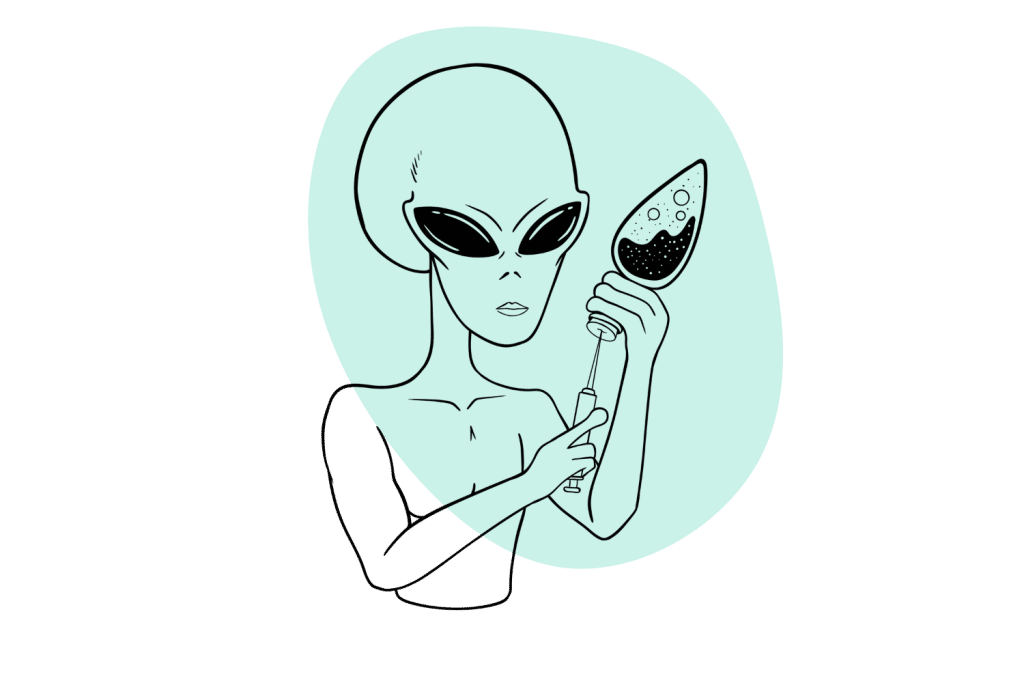
Insufflation (Snorting)
One of the traditional methods of using a DMT-containing herb called yopo is administered through insufflation. The process involves blowing the dried and powdered yopo seeds directly into the nasal cavity. The DMT is then absorbed through the microcapillaries lining the inside of the nose.
You can also snort DMT crystals after they’ve been sufficiently ground into a fine powder.
The downside of this method is that it can damage the nasal cavity, leaving a horrible taste in the mouth that can last several hours; additionally, many people report weaker effects when using DMT this way compared to other methods.
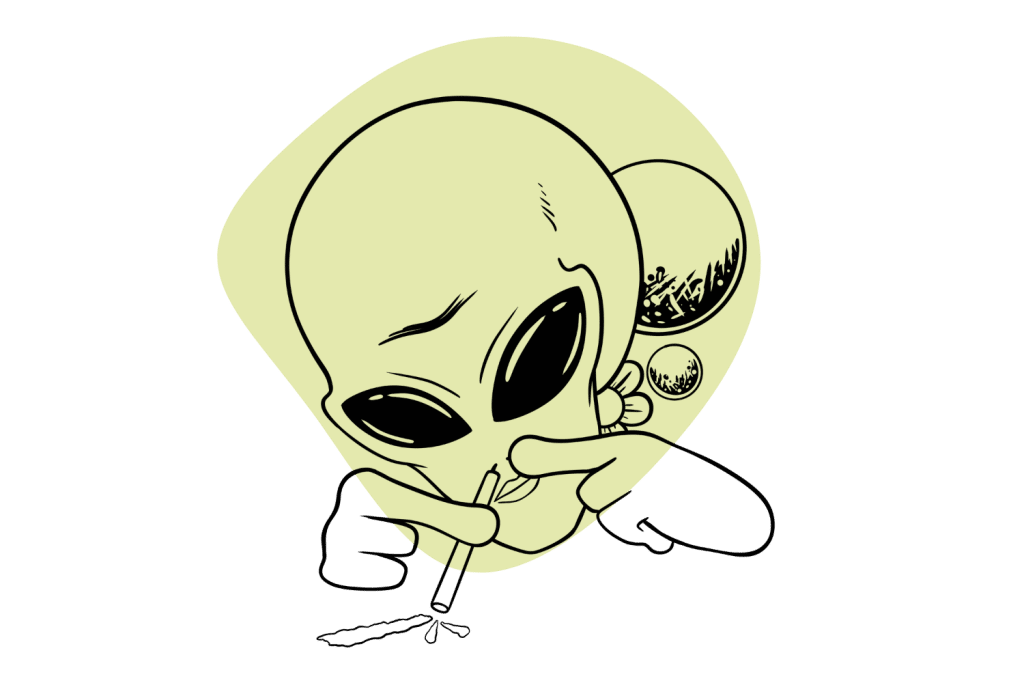
Drinking (Ayahuasca)
The only drinkable form of DMT you’re likely to find is ayahuasca.
Ayahuasca can be extremely potent, so it’s important to always use this traditional plant medicine in the presence of a trained shaman.
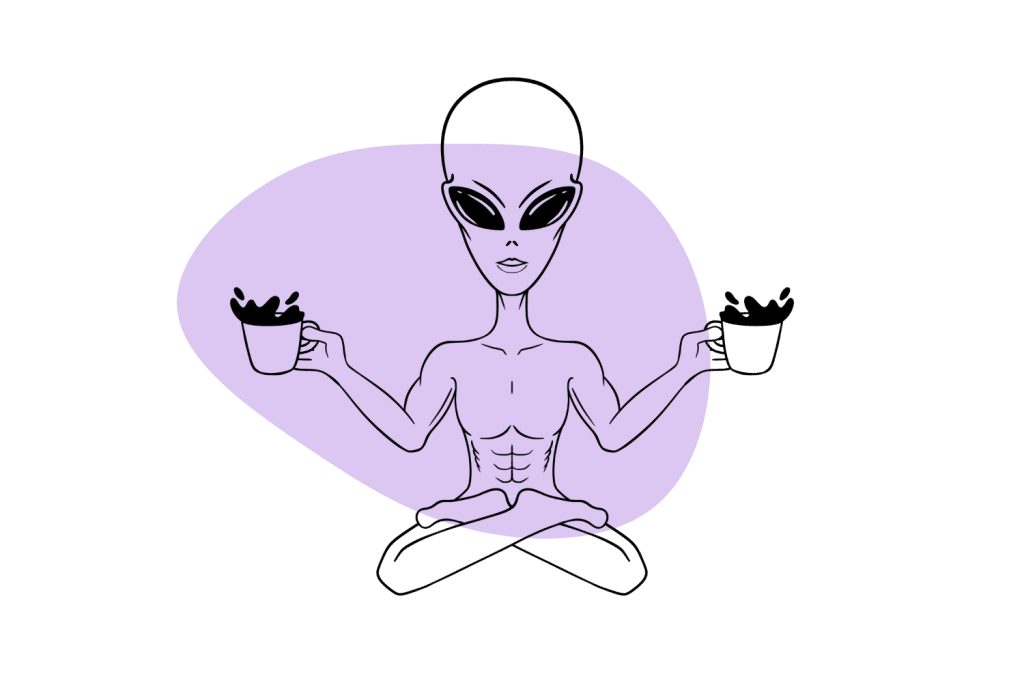
Frequently Asked Questions About DMT
1. Why Do So Many People Report Seeing Aliens After Taking DMT?
While it’s true that every DMT trip is unique, there are some curious similarities reported by various users. One of the most common experiences people report after using DMT is seeing or being abducted by aliens.
This experience is so common, researchers at John Hopkins University set out to investigate it.
A survey was published online asking anybody that has experienced “encounters with seemingly autonomous beings or entities after taking DMT” to answer some questions. The results of this study have yet to be published.
The prominent DMT researcher Rick Strassman also reported on this phenomenon. He mentioned that after giving several hundred doses of DMT to patients over the years, “many of them described deep interactions with non-human beings, describing them as jokers, clowns, aliens or helpers.”
Other reports refer to these beings as “machine elves” or “clockwork elves”. These beings are often described in strikingly similar descriptions by people taking DMT. These reports are often made well before the user becomes familiar with the pop culture description of what a machine elf may be.
Often described as tall, slim, silvery figures, the machine elves have neither a good nor bad sentiment.
The late Terence McKenna — one of the world’s leading psychedelic philosophers — touched on the topic of machine elves several times in his lectures.
In his own word:
What arrests my attention is the fact that this space is inhabited. You break into this space and are immediately swarmed by squeaking, self-transforming elf-machines… made of light and grammar and sound that come chirping and squealing and tumbling toward you.”
It remains a total mystery why so many people experience similar visions involving beings from another world or dimension with such strikingly similar physical descriptions.
It makes you wonder, doesn’t it?
2. Who Discovered DMT?
DMT was first synthesized in 1931 by a Canadian chemist named Richard Manske. However, at the time, the psychological effects of the compound were never explored — Manske had no idea what the importance of the compound he discovered would have on humanity several decades later.
Five years later, 5-MeO-DMT was synthesized for the first time.
Ten years later, Oswaldo Gonçalves de Lima was the first to identify DMT in plant sources (1946).
It wasn’t for another ten years that the hallucinogenic effects of DMT were first discovered. A scientist named Stephen Szara isolated DMT from the mimosa plant and tested it on himself. His reports of intense visions and dissolution are what formed the link between the sacramental use of DMT and the world of science.
4-AcO-DMT was discovered by the Swiss chemist Albert Hofmann, as well as Franz Troxler at Sandoz Laboratories in Switzerland in 1963.
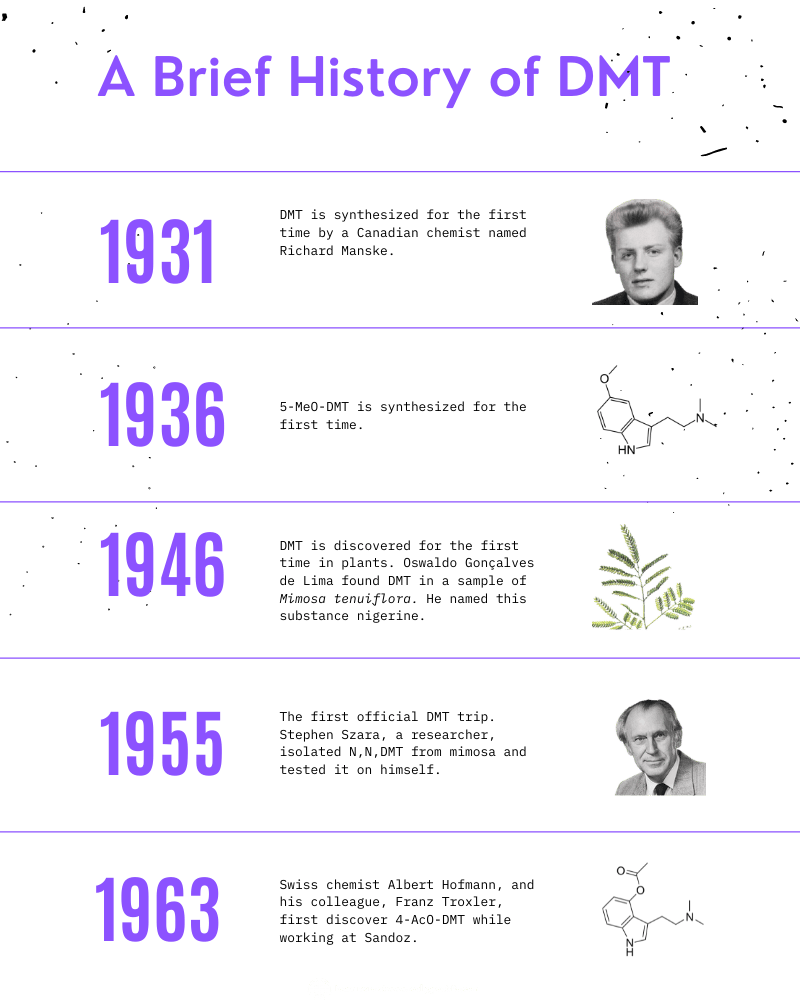
3. Is DMT a Protein?
A protein is any compound made from one or more amino acid chains.
DMT is based on the structure of an amino acid called tryptamine — but it’s not technically considered a protein because it’s not made up of amino acid “chains.” Instead, DMT is classified as an alkaloid — which is characterized by the presence of a nitrogen group in the molecule.
4. What Plants Contain DMT?
DMT is abundant in the plant kingdom. However, the majority of plant species contain only trace amounts of this alkaloid — far too low to produce any notable effects.
Plants with the most significant concentration of DMT include:
- Acacia spp. (Maiden’s Wattle)
- Anadenanthera spp. (Yopo)
- Arundo donax (Giant River Reed)
- Desmanthus illinoensis (Bundleflower)
- Diplopterys cabrerana (Chagro-panga)
- Mimosa pudica (Jurema)
- Phalaris Grass (Reed Canary Grass)
- Psychotria viridis
- Virola spp. (Epeña)
5. Why is DMT Referred to as “The Business Trip”?
DMT has an exceptionally short duration of effects (with the exception of ayahuasca). This means you can jump into a psychedelic trip in as little as 15 minutes and be back to (mostly) normal within an hour.
This fast turnaround has many referring to DMT as the “business trip,” — which refers to a quick (1 – 3 day) trip often involved with business-related travel.
6. How is DMT Made?
The easiest way to make DMT is to extract it from plants like mimosa or chacruna.
The process for synthesizing DMT isn’t incredibly difficult or complex but does require some harsh chemicals and access to expensive lab gear to perform properly.
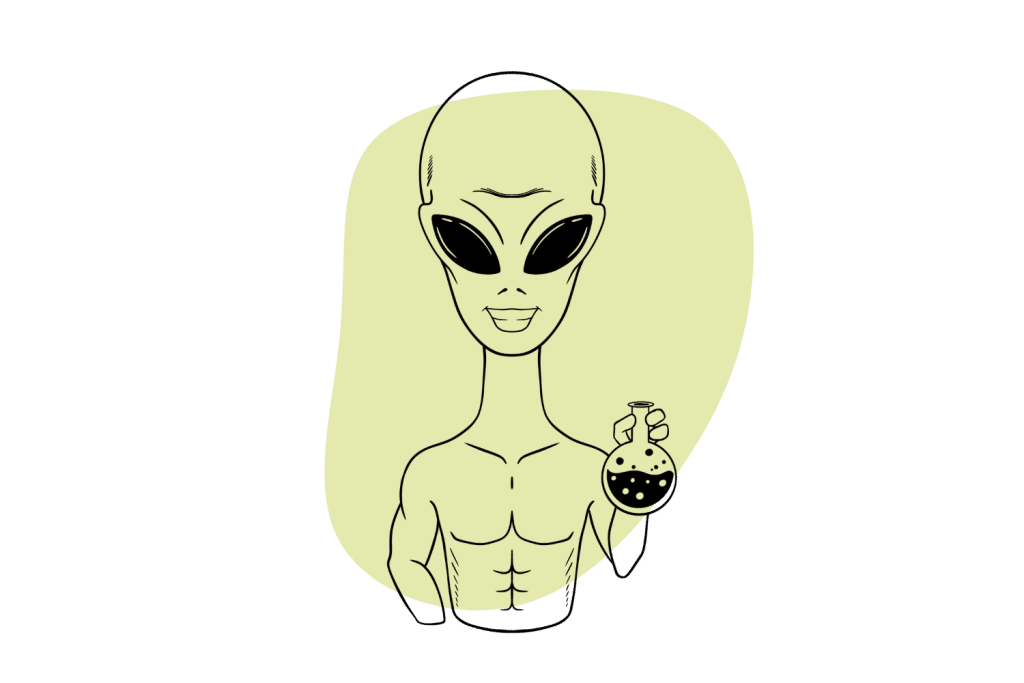
There are three main methods for synthesizing DMT — Eschweiler−Clarke reaction, the Speeter−Anthony tryptamine synthesis, and the Fischer indole reaction.
Key Takeaways: What is DMT?
DMT (dimethyltryptamine) is a naturally occurring psychedelic. It’s naturally produced by organisms from all walks of life — including the human brain.
This compound is thought to be involved with the regulation of the default mode network in the brain — which is responsible for maintaining our grasp on reality, separation of self and other, and regulating various habits and patterns experienced in our daily life.
DMT rests the DMN, causes a temporary loss of ego, and dramatically alters our perception of time and space.
There are few medical studies looking at the medicinal value of DMT outside of ayahuasca use — but the research we have so has shown promise that DMT could be useful for treating depression, addiction, anxiety, and much more.
Sign up for our newsletter to stay up to date on psychedelic news and developments!
References
- Kaplan, J., Mandel, L. R., Stillman, R., Walker, R. W., VandenHeuvel, W. J. A., Gillin, J. C., & Wyatt, R. J. (1974). Blood and urine levels of N, N-dimethyltryptamine following administration of psychoactive dosages to human subjects. Psychopharmacologia, 38(3), 239-245.
- Keiser, M. J., Setola, V., Irwin, J. J., Laggner, C., Abbas, A. I., Hufeisen, S. J., … & Whaley, R. (2009). Predicting new molecular targets for known drugs. Nature, 462(7270), 175-181.
- Burchett, S. A., & Hicks, T. P. (2006). The mysterious trace amines: protean neuromodulators of synaptic transmission in the mammalian brain. Progress in neurobiology, 79(5-6), 223-246.
- Szabo, A., Kovacs, A., Riba, J., Djurovic, S., Rajnavolgyi, E., & Frecska, E. (2016). The endogenous hallucinogen and trace amine N, N-dimethyltryptamine (DMT) displays potent protective effects against hypoxia via sigma-1 receptor activation in human primary iPSC-derived cortical neurons and microglia-like immune cells. Frontiers in neuroscience, 10, 423.
- O’Donovan, K. J., Tourtellotte, W. G., Millbrandt, J., & Baraban, J. M. (1999). The EGR family of transcription-regulatory factors: progress at the interface of molecular and systems neuroscience. Trends in neurosciences, 22(4), 167-173.
- DeSteno, D. A., & Schmauss, C. (2008). Induction of early growth response gene two expression in the forebrain of mice performing an attention-set-shifting task. Neuroscience, 152(2), 417-428.
- Urban, J. D., Clarke, W. P., Von Zastrow, M., Nichols, D. E., Kobilka, B., Weinstein, H., … & Miller, K. J. (2007). Functional selectivity and classical concepts of quantitative pharmacology. Journal of Pharmacology and Experimental Therapeutics, 320(1), 1-13.
- Halberstadt, A. L., & Geyer, M. A. (2011). Multiple receptors contribute to the behavioral effects of indoleamine hallucinogens. Neuropharmacology, 61(3), 364-381.
- Carhart-Harris, R. L., & Nutt, D. J. (2017). Serotonin and brain function: a tale of two receptors. Journal of Psychopharmacology, 31(9), 1091-1120.
- Barker, S. A. (2018). N, N-Dimethyltryptamine (DMT), an endogenous hallucinogen: Past, present, and future research to determine its role and function. Frontiers in neuroscience, 12, 536.
- Dos Santos, R. G., Valle, M., Bouso, J. C., Nomdedéu, J. F., Rodríguez-Espinosa, J., McIlhenny, E. H., … & Riba, J. (2011). Autonomic, neuroendocrine, and immunological effects of ayahuasca: a comparative study with d-amphetamine. Journal of clinical psychopharmacology, 31(6), 717-726.
- Santos, R. D., Landeira-Fernandez, J., Strassman, R. J., Motta, V., & Cruz, A. P. M. (2007). Effects of ayahuasca on psychometric measures of anxiety, panic-like, and hopelessness in Santo Daime members. Journal of ethnopharmacology, 112(3), 507-513.
- Osório, F. D. L., Sanches, R. F., Macedo, L. R., Dos Santos, R. G., Maia-de-Oliveira, J. P., Wichert-Ana, L., … & Hallak, J. E. (2015). Antidepressant effects of a single dose of ayahuasca in patients with recurrent depression: a preliminary report. Brazilian Journal of Psychiatry, 37(1), 13-20.
- Halpern, J. H. (1996). The use of hallucinogens in the treatment of addiction. Addiction Research, 4(2), 177-189.

